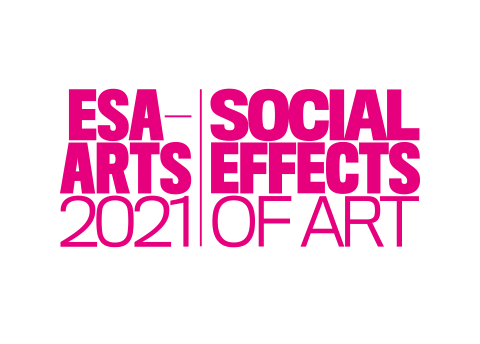Abstract submission - ESA arts2021
Abstract submission
FORMATS OF PRESENTATION
-
Invited keynote lectures
-
presentation of contributed papers (90 minutes sessions with 4 papers)
-
distributed papers and posters
-
panels, roundtables or workshops (45-90 minutes)
GUIDELINES FOR SUBMITTING AUTHORS
Abstracts should be 300-400 words, and they must be written in English. You are not allowed to submit more than two abstracts (as first author).
The information requested during abstract submission include:
1. name(s) of the author(s), institutional affiliation (both university and department), mailing address and email(s)
2. title of proposed presentation or panel/roundtable/workshop and indication of
proposal format
3. area of presentation (01RN02-12RN02)
4. up to 3–5 keywords.
Panel, roundtable or workshop proposals can be related to the following areas
• 01RN02: Developments in particular domains of the arts: architecture, urban planning, applied arts, arts within the domain of popular culture as well as traditional ‘high’ arts.
• 02RN02: The process of production, distribution, promotion and commercialisation of works of art: artistic practices, the impact of technology, new means of production, forms of collaboration, the formation of art theory, the development of arts markets, the process of valuation.
• 03RN02: The process of presentation and mediation of arts: art criticism and publicity in all domains of the arts, museums, theatres, concerts, audience studies, attitudes towards the audience, educational programs.
• 04RN02: Professional development: amateurs and semi-amateurs, vocational education, art schools, professional differentiation, artistic income, artistic reputation.
• 05RN02: Arts organisation and management: investigation of historical development, power relations, effects, managerial processes and practices, programme selection, processes, tasks and roles within the organisation such as gatekeeping, leadership.
• 06RN02: Arts policy (especially the sociological aspects thereof): legal issues, public and private funding, public discourse and debates (e.g. classification of art, arts and religious symbols, arts and sexuality, arts and racism), censorship, analysis of the impact of arts, sustainability, lobbying associations, cultural ministries or other government bodies, development of cultural policies across time and place.
• 07RN02: Social and cognitive effects of the arts: arts and identity formation, arts and bodies, aesthetic experience, arts and ethics, coding and decoding, gender related practices, ethnographic aspects, art for social transformation, arts in communities, art for individual, collective and public memory.
• 08RN02: Arts from a macro-sociological perspective: (de-)institutionalisation, economisation, globalisation vs. localism, digitalisation, media morphosis, arts and social cohesion, arts and ethics, arts and hegemony and arts and power.
• 09RN02: Theoretical development in arts sociology: the production of culture approach, (post-)structuralism, field theory, system theory, praxeology as well as methodological issues.
• 10RN02: Arts and everyday life: relations between art worlds and day-to-day worlds, the experiential and the sensory, embodied and mediated elements of practice and places, the social and cultural significance of the senses, the aesthetics of everyday life, and sociological or interdisciplinary approaches to the everyday and to daily and organizational life.
• 11RN02: Art and the city: art and urban activism, cultural urban regeneration, art and city development, cultural quarters and gentrification, urban artistic interventions, art and rights to the city, artistic effects on the city, artists in creative placemaking, artists and urban symbolic economy.
• 12RN02: Sociology of the arts (open): papers that do not fit into one of the suggested sessions above should be submitted to this open session.
